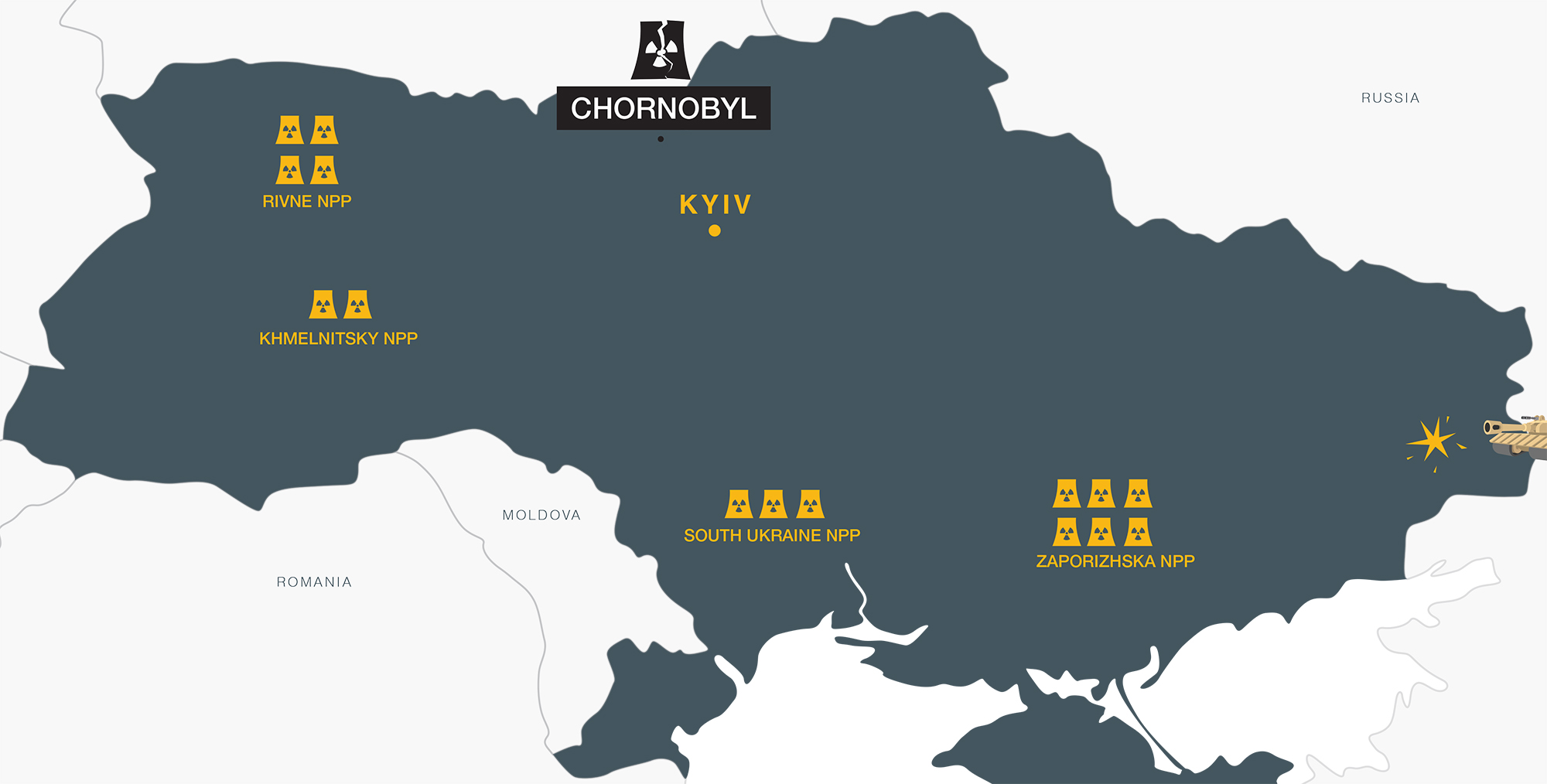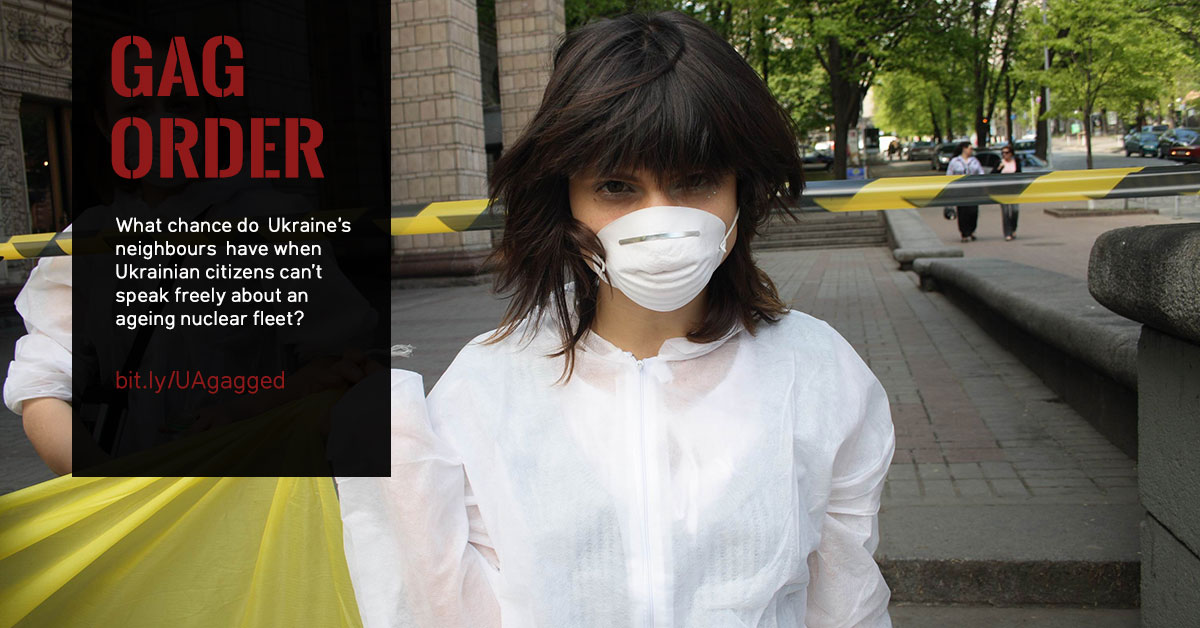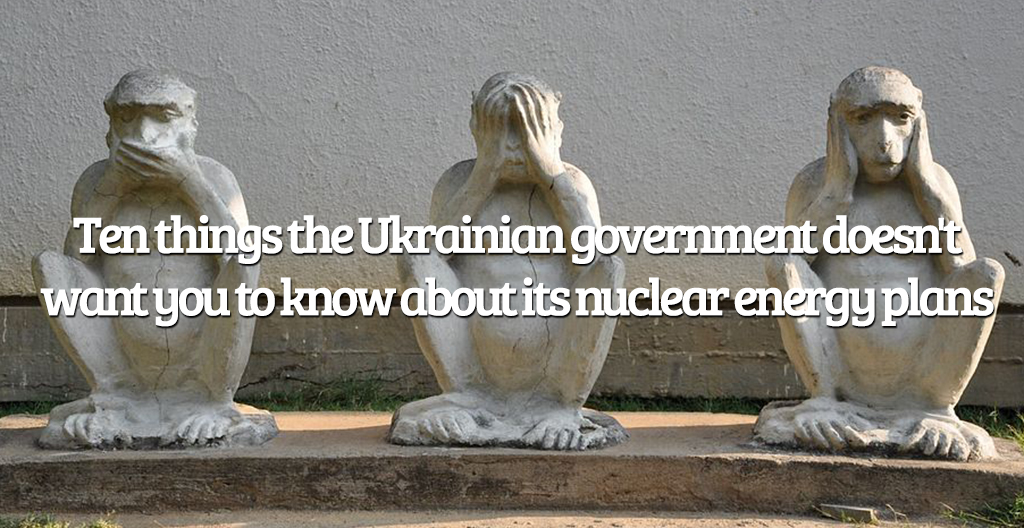ARCHIVED: Zombie reactors in Ukraine
While the European Union is trying to help Ukraine’s political transition, Europe’s financial support is cementing the country’s dependence on an outdated and highly unsafe nuclear sector. To avoid further instability and political and environmental risks, European institutions need to offer better oversight and funding for alternative energy sources.

Stay informed
We closely follow international public finance and bring critical updates from the ground.
Key facts
Ukraine’s so-called ‘nuclear safety upgrade programme’ is necessary to keep Ukraine’s ageing nuclear reactors working longer than they were designed to. Costs: estimated with EUR 1.45 billion Public financing: EUR 600 million (300m each from Euratom and EBRD), partially disbursed Bankwatch calls on European institutions to re-direct their funding towards safer and sustainable energy solutions.
Meet our campaigners Iryna Holovko, Campaign lead, Ukraine Dana Marekova, Slovakia Ana-Maria Seman, Romania Akos Eger, Hungary
Key issues
- Design lifetime of 12 soviet-era nuclear reactors ends before 2020. Six lifetimes already prolonged, same is planned for the rest. more >>
- The safety of Ukraine’s reactors cannot be guaranteed: vicinity to armed conflict, accidents and safety issues. more >>
- EUR 600 million from European institutions supports programme crucial for these plans. more >>
- Government is stifling dissent, breaching international law. Potential implications for Ukraine’s transition and EU relations. more >>
- Supply and disposal of nuclear fuel mean continued dependence on Russia more >>
Background
Teaser trailer for “No safe atom”. Turn on subtitles in the settings on the bottom right. Watch the full 11 minute film on YouTube >>
Ukraine's nuclear timebomb
Ukraine has 15 soviet-era nuclear reactors built during Soviet times. 12 were designed to be shut down by 2020.
Kyiv is determined to keep all reactors running for at least ten years beyond their expiry date.
The lifetimes of six reactors have already been expanded without completing necessary safety upgrades, without properly assessing all risks and without considering sustainable alternatives.
Read more:
Europe’s false solutions for Ukraine’s energy woes
Blog post | March 9, 2016
Safety cannot be guaranteed
Europe’s biggest nuclear power plant in Zaporizhia is located only 250 kilometres from the frontlines of the ongoing armed conflict in eastern Ukraine.
Video: Sergei Shygyn, chief specialist for nuclear reactors at the Zaporizhia nuclear power plant confirms that the plant was not designed to withstand a war.
Read more:
Ukraine Nuclear Safety Upgrade Programme: loan conditions not met
Briefing | January 21, 2016
Europe's support for Ukraine's nuclear gamble
Two European public lenders, Euratom and the European Bank for Reconstruction and Development, approved loans over EUR 300 million each for a so-called ‘safety upgrade’ project necessary to keep Ukraine’s ageing nuclear reactors running.
For comparison, EUR 600 million is nearly a quarter of the total EU support (excluding Euratom) to Ukraine’s energy sector between 2007-2014.
What is worse, Ukraine unilaterally decided to postpone the safety upgrades. While safety is being delayed, the ageing reactors continue their operations.
Read more:
Ukraine snubs safety concerns and European donors, extends lifetime of fourth Soviet-era nuclear reactor
Press release | December 8, 2015
Stifled dissent, no public control
Despite the EU’s financial support, Ukraine’s government gets away with stifling dissent and breaching international law. This could have far reaching implications for Ukraine’s transition and its relations with EU countries and the EU.
Breach of international law
In April 2013, the UN Espoo monitoring body ruled that Ukraine had breached the Espoo Convention when extending the licenses for two units at the Rivne nuclear power plant. The decision was taken without a transboundary environmental impact assessment (EIA) and without informing neighbouring countries about the plans, as Espoo procedures would require.
The governments of Slovakia, Romania, and Hungary have asked Ukraine for information on its nuclear power plans, requesting Ukraine to initiate public consultations in neighbouring countries. So far, Ukraine denies these requests (see responses to Slovakia and Hungary).
Also the European Commission stated in a letter (pdf) that Ukraine must adhere to the Aarhus and Espoo conventions. So far, however, it has taken no steps to make Ukraine’s government comply.
Read more:
Ukraine’s Nukes Are in Breach of UN Convention
Press release | April 22, 2013
Letter to Marco Buti, Director General for Economic and Financial Affairs (pdf)
Policy letter | August 10, 2015
Stifling dissent
In 2015, Ukraine’s state-owned nuclear operator Energoatom sued civil society organisation National Ecological Centre of Ukraine (NECU), alleging that NECU had published misleading information about safety standards at unit 2 of the South Ukraine nuclear power plant. Bankwatch’s member group NECU was forced to post a retraction on its website.
Despite the case attracting international attention, the Ukrainian government appears keen to block public debate, both at home and abroad.

Dependence on Russia
Ukraine’s dependence on Russian gas supplies is often used to defend the support for nuclear energy. But all of Ukraine’s nuclear reactors use Russian technology and nuclear fuel from Russia. Despite efforts to diversify with with America’s Westinghouse, Russian fuel is still used at all nuclear units in Ukraine.
Spent fuel is sent back to Russia, providing ample opportunity for Russia to put pressure on Ukraine, which has so far built no infrastructure for the long-term, safe isolation of spent fuel and radioactive waste produced during the reprocessing of spent fuel in Russia.
Latest news
Chernobyl e Zaporizhska: le centrali nucleari ucraine che spaventano l’Europa
Bankwatch in the media | 4 March, 2022Le truppe russe di Putin hanno da giorni preso il controllo del sito nucleare del catastrofico disastro del 1986 e circondato la centrale …
Read moreWhy Ukraine should move away from nuclear power
Bankwatch in the media | 3 March, 2022In 1983, the Soviet Union inaugurated two nuclear reactors in what is now Ukraine. One of them, unit four at Chernobyl, experienced an …
Read moreNuclear safety in Europe: decision-making behind closed doors?
Blog entry | 4 July, 2017European citizens don’t want to be left out of decision-making over nuclear power. But a recent meeting of the Espoo Convention reveals how concerns over reactor life-time extensions are being sidelined.
Read moreRelated publications
Ukraine nuclear lifetime extensions require impact assessment in compliance with Aarhus and Espoo convention
Advocacy letter | 18 August, 2015 | Download PDFOn several occasions the European Bank for Reconstruction and Development stated that operations of its clients should comply with all international treaties and other legal obligations. In spite of these reassurances, Energoatom in Ukraine keeps ignoring its international obligations, as outlined in the Espoo Convention, in the processes of assessing the life-time extension of its nuclear reactors.
Letter to European Commission: Reconsider disbursement of loans for Ukraine nuclear project
Advocacy letter | 10 August, 2015 | Download PDFIn this letter, Bankwatch asks the European Commission to reconsider the disbursement of the Euratom and EBRD loans for the Ukraine nuclear safety upgrade programme that effectively enables the lifetime extensions at Ukraine’s nuclear reactors. The letter provides evidence for the intertwined character of the upgrade programme and the lifetime extensions and for Ukraine’s refusal to meet its obligations under international conventions.
Letter to European Commission (DG ECFIN): Ukraine does not meet obligations under international law
Advocacy letter | 10 August, 2015 | Download PDFThe European Commission stated in an earlier letter that any decision by Ukraine to extend the life-span of any of its nuclear power plants will require assessment under the Aarhus and Espoo Conventions. In this letter, Bankwatch offers evidence for how Ukraine is indeed extending the lifetimes of its nuclear reactors but not meeting its obligations under the conventions.

